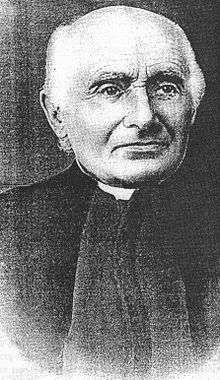Cyril Sielecki
Cyril Sielecki[1] (29 April 1835 – 28 April 1918), first name also spelled Cyryl,[2] was a Polish priest of the Greek Catholic Diocese of Przemyśl, and an educational and social activist. He was the founder of the religious congregations of the Sisters Servants of Mary Immaculate, as well as the Sisters of Saint Joseph. He was recognized as a servant of God.
Cyril Sielecki (first name also spelled Cyryl) | |
|---|---|
 Cyril Sielecki | |
| Church | Greek Catholic |
| Orders | |
| Ordination | 8 January 1860 |
| Personal details | |
| Born | 29 April 1835 Podbuż, Galicia, Austrian Empire |
| Died | 28 April 1918 (aged 82) |
| Denomination | Greek Catholic |
| Parents | Michał Sielecki Joanna Sielecki |
| Spouse | Emilia, daughter of Mikołaj Iwasiwki |
| Children | Two daughters |
| Occupation | Priest |
| Alma mater | • General Seminary in Lwów • Lviv University |
Biography
He was born in Podbuż, in east Galicia, which was part of the Austrian Empire. He came from the Polish aristocratic Sielecki family. His father, Michał, was a teacher, and his mother, Joanna, took care of the children.
Starting in 1843, the family lived in Sambor, where Cyril graduated from elementary school and middle school and completed high school. He then joined the General Seminary in Lwów and thus began to study theology at Lviv University. After three years of residence in Lwów he then continued at the seminary in Przemyśl.
After graduating from the seminary, he married Emilia, daughter of Mikołaj Iwasiwki, a Greek Catholic priest. After six years of marriage, she died, leaving her husband with two daughters. One died shortly after a serious illness, and the younger one grew up in the care of the Basilian sisters in Jaworów.
On 8 January 1860, he was ordained to the priesthood under the ministry of the bishop of Przemyśl, Grzegorz Jachimowicz. For 14 years, he worked at the parish and lived very modestly. He was vicar and administrator for the communities of Stara Sól, Bilicz, Milków, Lubaczów and Jaworów.[3]
In 1874, he became pastor of the villages Żużel and Ceblów. In both parishes, he devoted his life to the improvement of the social conditions. He was also in contact with blessed Josaphata Hordashevska.[4]
As pastor, he began his activities with the renewal of religious life entrusted to his parishioners. He completed the construction of the church in Żużel, and improved on the church in Ceblów. His activities were recognized by Bishop Konstantyn de Czechowicz during a canonical visitation of the parish in Żużel and Ceblów in 1905.
He was actively involved in the campaign against the scourge of alcoholism in the countryside, a concern of both the Roman and Greek Catholic churches. In cooperation with the local intelligence he organized sobriety help groups. He also tried to raise the local level of education. To improve the financial situation of the parish, he founded a society whose members committed themselves to helping widows, orphans and forgotten people in the parish. He also founded what is considered one of the first orphanages in Galicia.
In his social activities he also worked closely with the local Polish nobility. He was particularly strongly associated with Count Stanisław Antoni Potocki, whom he met as a priest in Milków. Potocki had a farm in Oleszyce and together with Sielecki tried to eliminate illiteracy and alcoholism in the region. In her memoirs, Countess Anna Potocka called him a friend of the family.[5]
In 1892, he co-founded the religious congregations of the Sisters Servants of Mary Immaculate, as well as later on the Sisters of Saint Joseph to promote good deeds. The last 10 years of his life were devoted to the new congregation of the Sisters of St. Joseph.
In honour of his various religious and social activities, he was awarded the title of Papal chamberlain, which was one of the highest honours that could be bestowed by the Pope, and was often given to members of noble families. For distinguished services he was made a knight of the Austrian Order of Franz Joseph in 1910.
He died, age 82, at Żużel and was officially declared a servant of God.
References
- Handbuch des Statthalterei-Gebietes in Galizien für das Jahr 1862, p. 274, at Google Books
- Handbuch des allerhöchsten Hofes und des Hofstaates seiner K. Und K. Apostolischen Majestät, 1913, p. 343, at Google Books
- "Lubaczów". Grekokatolicy.pl. Ekumeniczny Portal Greckokatolicki. 2010. Retrieved 6 March 2014.
- "Życiorys założyciela". sluzebniczkinmp.pl. Siostry służebniczki starowiejskie. 2014. Retrieved 6 March 2014.
- "Drugim przyjacielem od serca mego Męża był ksiądz Cyryl Sielecki", in Mój pamiętnik at Google Books, p. 175. 1927.
External links
![]()